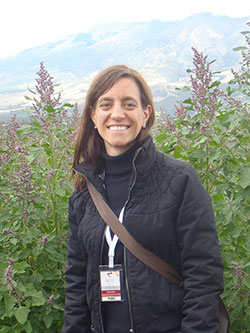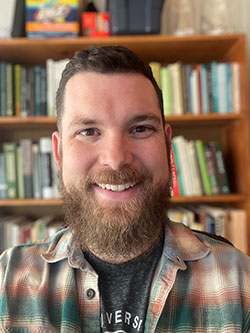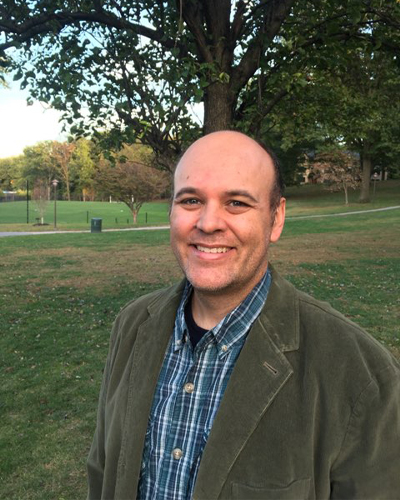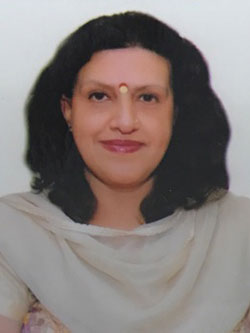2025 Candidate Bios
Vice President/President-Elect
Maria Bruno
 Maria Bruno was introduced to ethnobiology as an undergraduate Anthropology major at the University of Nevada, Reno (UNR) where she attended her first SOE Annual meeting in 1998. From Nevada, she went on to pursue graduate work in Andean archaeology and paleoethnobotany at Washington University in St. Louis. Her research has focused on the history and development of Indigenous agricultural practices in the Lake Titicaca Basin of Bolivia through ethnobotanical and paleoethnobotanical research. She recently (2024) published the book, Growing the Taraco Peninsula: Past and present indigenous agricultural landscapes of Lake Titicaca, Bolivia, with the University Press of Colorado. She was a faculty member in the Anthropology & Archaeology Department of Dickinson College from 2011 to 2022. She is currently adjunct faculty in the Anthropology Department at her alma mater, UNR, and is helping to host the 2025 SOE Annual Meeting at the Lake Tahoe campus. She has served as co-editor of Ethnobiology Letters since 2020.
Maria Bruno was introduced to ethnobiology as an undergraduate Anthropology major at the University of Nevada, Reno (UNR) where she attended her first SOE Annual meeting in 1998. From Nevada, she went on to pursue graduate work in Andean archaeology and paleoethnobotany at Washington University in St. Louis. Her research has focused on the history and development of Indigenous agricultural practices in the Lake Titicaca Basin of Bolivia through ethnobotanical and paleoethnobotanical research. She recently (2024) published the book, Growing the Taraco Peninsula: Past and present indigenous agricultural landscapes of Lake Titicaca, Bolivia, with the University Press of Colorado. She was a faculty member in the Anthropology & Archaeology Department of Dickinson College from 2011 to 2022. She is currently adjunct faculty in the Anthropology Department at her alma mater, UNR, and is helping to host the 2025 SOE Annual Meeting at the Lake Tahoe campus. She has served as co-editor of Ethnobiology Letters since 2020.
Maria views ethnobiology as an avenue to bring together diverse communities through shared interests and compassion for all beings that share this world. She hopes to continue efforts to broaden the society’s membership, publications, activities, and impact through engagement with Indigenous, professional, and avocational groups locally and internationally.
Treasurer-Elect
Jonathan Dombrosky
 Jonathan Dombrosky is the environmental archaeologist at Crow Canyon Archaeological Center, located in southwestern Colorado. He uses large datasets to answer broad questions about past human-environment interaction in the central Mesa Verde region. Some of his other major projects have focused on Ancestral Pueblo fishing strategies in the Middle Rio Grande region of New Mexico during the late pre-Hispanic period. He has wide-ranging interests in human behavioral ecology, stable isotope ecology, 3D geometric morphometrics, radiocarbon chronology building, and conservation biology.
Jonathan Dombrosky is the environmental archaeologist at Crow Canyon Archaeological Center, located in southwestern Colorado. He uses large datasets to answer broad questions about past human-environment interaction in the central Mesa Verde region. Some of his other major projects have focused on Ancestral Pueblo fishing strategies in the Middle Rio Grande region of New Mexico during the late pre-Hispanic period. He has wide-ranging interests in human behavioral ecology, stable isotope ecology, 3D geometric morphometrics, radiocarbon chronology building, and conservation biology.
He is strongly committed to data science and open science practices. His skills align with transparency and accuracy in financial management. As the treasurer for the society, he would apply these values to ensure clear, accountable, and collaborative financial workflows.
Promotion and Outreach Coordinator: Publicity and Community Engagement
Joshua Drew
 Joshua Drew is an assistant professor of vertebrate conservation biology at the State University of New York's College of Environmental Science and Forestry (SUNY ESF) in Syracuse NY. During his career he has described six species of fish, worked on the evolution of marine biodiversity in the South Pacific and investigated shark toothed weapons of the I-Kiribati people. Now, as the director of the CHAOS (Coupled Human and Aquatic Organismal Systems) lab, he and his students use feminist approaches to identify strategies for aquatic conservation that center and support the rights and voices of local and Indigenous people and the waters they depend on. He is also a strong believer in outreach and making science accessible which has led him to present his research to a variety of audiences, including both US senators and drag queens, but he'll leave it up to you to decide which was more fun.
Joshua Drew is an assistant professor of vertebrate conservation biology at the State University of New York's College of Environmental Science and Forestry (SUNY ESF) in Syracuse NY. During his career he has described six species of fish, worked on the evolution of marine biodiversity in the South Pacific and investigated shark toothed weapons of the I-Kiribati people. Now, as the director of the CHAOS (Coupled Human and Aquatic Organismal Systems) lab, he and his students use feminist approaches to identify strategies for aquatic conservation that center and support the rights and voices of local and Indigenous people and the waters they depend on. He is also a strong believer in outreach and making science accessible which has led him to present his research to a variety of audiences, including both US senators and drag queens, but he'll leave it up to you to decide which was more fun.
My first professional meeting ever was at the Society for Ethnobiology in Seattle in 2003 and I remember as a MS student not knowing anyone there, the feeling of welcoming and belonging that the society curated. Now that I've grown in my career, I want to ensure that we continue that legacy of warmth, inclusivity and welcoming to all members of our community. This position will allow us to engage with a larger group of people and hopefully foster honest and productive communications within our society and with our larger community.
Dr. Anju Sehgal
 Anju Sehgal is an ethnobotanist who has served as Professor of Botany for more than 34 years. She has also worked as Principal/Director of different Colleges in Himachal Pradesh India. Anju was introduced to ethnobiology while doing her doctorate. She became a member of the Society of Ethnobiology in the year 2009 and has attended all conferences in person starting from 2015 in UCSD, 2018 Madison, Wisconsin, 2019 Vancouver UBC, Botany 2024 Grand Rapids Michigan (in person) and 2021 Utah, 2022 Utah, 2023 by virtual means, and 2024 in Missouri in hybrid mode. At present she is an executive council member of the Society for Ethnobotany USA and a member of the Botanical Society of America. She has attended in person the Botany 2024 meetings in Grand Rapids Michigan. She is strongly committed to ethnobiology and studies ethnobotany of Tribal people of India e.g., Jammu and Kashmir, Himachal, Panjab, Rajasthan, Meghalaya, Assam, etc. So far she has worked on plants of higher altitudes, lakes, Alpine deserts, Himalayan parks, and Sacred Groves. She has authored many publications including books into her account. She has facilitated workshops, seminars, and conferences by delivering expert talks, having sessions, chairing sessions, or managing the entire finances. She has been attending ethnobiology/ ethnobotany conferences in person since 2015, travelling the long distance from India to America. Anju has received travel awards thrice to the tune of $1000 each from SoE and BSA. She is presently giving advice to NIT Meghalaya Shillong as Adjunct Professor and also to NIT Hamirpur HP as Ombudsperson. She is superannuated as Principal from Govt. PG College Hamirpur HP, India and is now a full time researcher as well as music lover, desperate inquisitive learner, and passionate worker. She has also established and started a new masters courses in her colleges where she worked.
Anju Sehgal is an ethnobotanist who has served as Professor of Botany for more than 34 years. She has also worked as Principal/Director of different Colleges in Himachal Pradesh India. Anju was introduced to ethnobiology while doing her doctorate. She became a member of the Society of Ethnobiology in the year 2009 and has attended all conferences in person starting from 2015 in UCSD, 2018 Madison, Wisconsin, 2019 Vancouver UBC, Botany 2024 Grand Rapids Michigan (in person) and 2021 Utah, 2022 Utah, 2023 by virtual means, and 2024 in Missouri in hybrid mode. At present she is an executive council member of the Society for Ethnobotany USA and a member of the Botanical Society of America. She has attended in person the Botany 2024 meetings in Grand Rapids Michigan. She is strongly committed to ethnobiology and studies ethnobotany of Tribal people of India e.g., Jammu and Kashmir, Himachal, Panjab, Rajasthan, Meghalaya, Assam, etc. So far she has worked on plants of higher altitudes, lakes, Alpine deserts, Himalayan parks, and Sacred Groves. She has authored many publications including books into her account. She has facilitated workshops, seminars, and conferences by delivering expert talks, having sessions, chairing sessions, or managing the entire finances. She has been attending ethnobiology/ ethnobotany conferences in person since 2015, travelling the long distance from India to America. Anju has received travel awards thrice to the tune of $1000 each from SoE and BSA. She is presently giving advice to NIT Meghalaya Shillong as Adjunct Professor and also to NIT Hamirpur HP as Ombudsperson. She is superannuated as Principal from Govt. PG College Hamirpur HP, India and is now a full time researcher as well as music lover, desperate inquisitive learner, and passionate worker. She has also established and started a new masters courses in her colleges where she worked.
